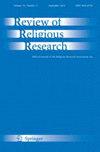Explanations for Individual Secularization: Exploring the Effects of Life Course Events on Religious Decline in the Netherlands Between 2009 and 2020
IF 1.7
1区 哲学
0 RELIGION
引用次数: 0
Abstract
The process of secularization in Western societies, in terms of the decline of individual religiosity, is often explained by way of cohort and period effects. In addition, there are many studies that focus on micro-level life course events that are considered to change individual religiosity. In this article, we use excellent panel data for the years 2009 to 2020 to distinguish the effects of 10 life course events on individual religiosity from cohort and period effects. Our object of study is the Netherlands, a forerunner in the process of secularization. The analyses, that is, mixed-effect regression models with almost 42,000 observations, reveal that completing an education, getting married or divorced, starting to cohabite, and receiving a higher income all affect individual religiosity. However, period effects and cohort differences are more important for Dutch secularization than life course events.个人世俗化的解释:探索 2009 至 2020 年间生命历程事件对荷兰宗教衰落的影响
西方社会的世俗化进程,即个人宗教信仰的下降,通常是通过群组效应和时期效应来解释的。此外,还有许多研究关注微观层面的生命历程事件,这些事件被认为会改变个人的宗教信仰。在本文中,我们利用 2009 年至 2020 年的优秀面板数据,将 10 个生命历程事件对个人宗教信仰的影响与队列效应和时期效应区分开来。我们的研究对象是世俗化进程的先行者荷兰。分析(即使用近 42,000 个观测值的混合效应回归模型)显示,完成学业、结婚或离婚、开始同居以及获得更高的收入都会影响个人的宗教信仰。然而,与生命历程事件相比,时期效应和队列差异对荷兰世俗化的影响更为重要。
本文章由计算机程序翻译,如有差异,请以英文原文为准。
求助全文
约1分钟内获得全文
求助全文
来源期刊

Review of Religious Research
Multiple-
CiteScore
2.50
自引率
20.00%
发文量
31
期刊介绍:
The Review of Religious Research (RRR) publishes empirical social science research on religion, primarily in sociology and social psychology and related fields of psychology, and scholarly literature reviews of research in these fields. RRR provides a forum for research across multiple disciplines and approaches, including research on the following topical areas: Clergy; Church programs; Comparative analyses of religious denominations and institutions; Denominational and congregational growth, decline, and vitality; Denominational and congregational conflict, competition, and cooperation; Ethnicity/race and religion; Generational and personal religious change; New religious movements; Personal spiritual and religious beliefs and practices; Religion and attitudes; Religion and family; Religion and gender, Religion and social behavior; Religion and well-being; and Research methodology. Among the characteristics that distinguish RRR from other academic journals on the study of religion are its applied focus and the opportunities it offers for academics and denomination-based researchers to share their findings with each other. RRR aims to facilitate the sharing and comparing of applied studies between denominational and academic researchers. RRR is the official quarterly journal of the Religious Research Association, Inc. RRR regularly publishes Original Articles, Research Notes, Review Articles, Applied Research Abstracts, and Book Reviews, and occasionally publishes articles on the Context of Religious Research. Applied Research Abstracts: This type of publication (previously called Denominational Research Reports) consists of a 350-550 word summary (without any references) of an applied research study in the form of a structured abstract, with the following section headings: Background, Purpose, Methods, Results, and Conclusions and Implications, followed by 3-4 keywords. The author may included a footnote that states: (a) whether a complete report exists and how it can be obtained; (b) whether the raw data are available in electronic form and how they can be obtained if the authors wish to make them available to other researchers; and (c) whether the authors would like to collaborate with other researchers to further analyze the data and write a full report for possible journal publication as a peer-reviewed manuscript. Such abstracts should be submitted to the journal editor for consideration for publication. Book Reviews: Unsolicited book reviews are not accepted for publication in RRR. If you would like to review a book for the journal, contact the Book Review Editor, David Eagle, Ph.D. – david.eagle@duke.edu Context of Religious Research: This journal heading covers items about awards and announcements, memoriams, and articles about the research process (e.g., articles on research methods and statistics, and profiles of denominational research organizations), as well as invited addresses to the Religious Research Association. Unsolicited articles should be submitted to the journal editor for consideration for publication. Original Articles: These are scholarly and methodologically sophisticated research studies: see Information for Authors on this website and the Submission Guidelines on the Springer RRR website for details (https://www.springer.com/13644) Reseach Notes: These are scholarly and methodologically sophisticated research studies: see Information for Authors on this website and the Submission Guidelines on the Springer RRR website for details (https://www.springer.com/13644) Review Articles: Authors should send an email to the journal’s editor describing the nature and scope of a proposed literature review to see if it is suitable for publication in RRR. See Information for Authors on this website and the Submission Guidelines on the Springer RRR website for details (https://www.springer.com/13644) The journal’s editor is Kevin J. Flannelly, Ph.D. – kjflannelly@gmail.com
 求助内容:
求助内容: 应助结果提醒方式:
应助结果提醒方式:


